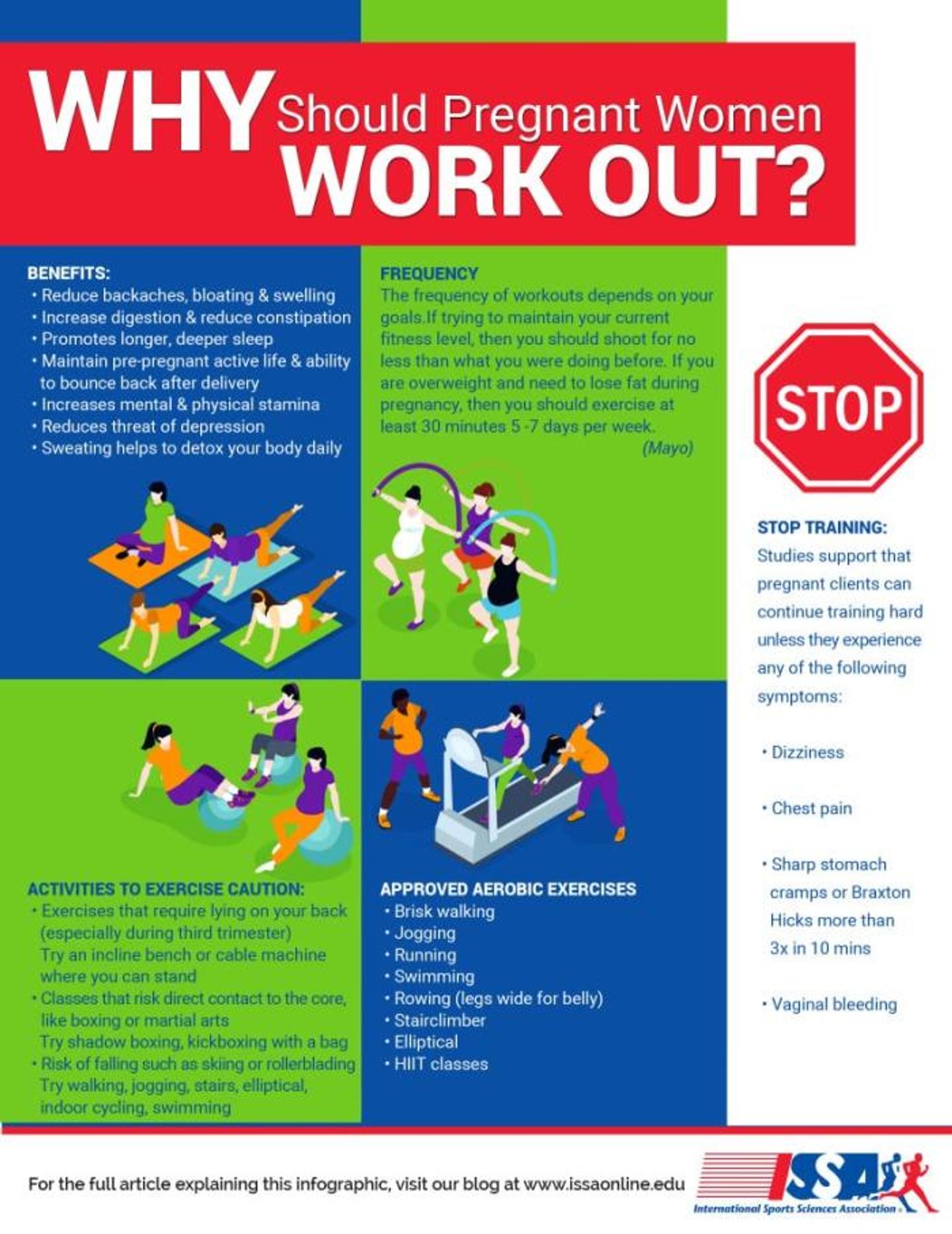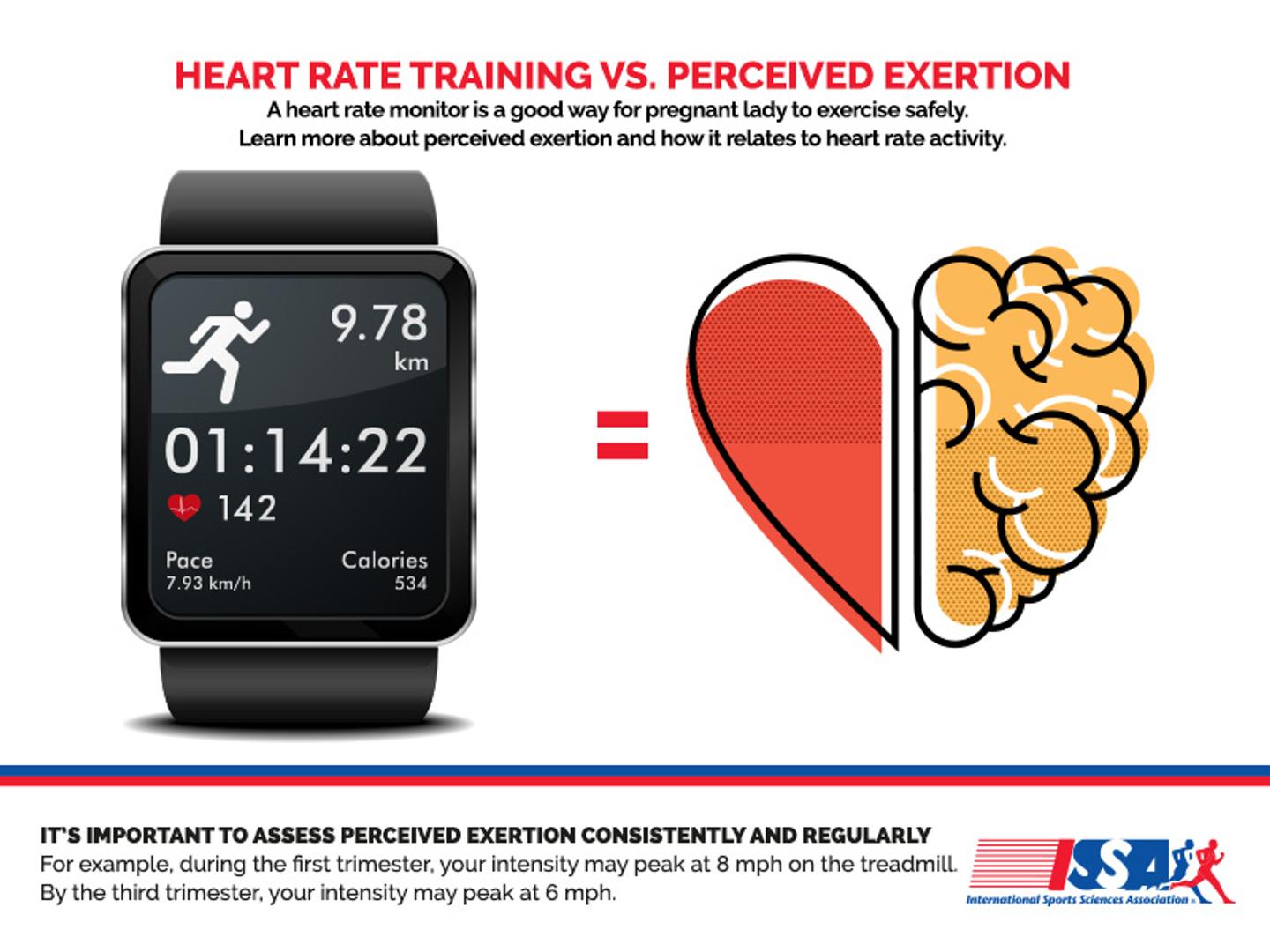
Should a Pregnant Woman Push Hard in Workouts?
BY: Amber Dobecka
DATE: 2022-04-07
Being pregnant and training regularly throughout pregnancy is like the girl at the gym who’s on the stair climber with ankle weights: She’s working twice as hard just to keep up.
But just because it’s harder doesn’t mean it shouldn’t be done.
Working out while pregnant is the perfect opportunity to see the progress that goes beyond aesthetics. During my pregnancy, I gained muscle, burned fat, and accomplished athletic goals that led to a stronger me both during and after pregnancy.
First, should pregnant women exercise?
Yes, as long as there is no complication. The American College of Obstetrician and Gynecologist issued a committee opinion in 2015 saying that women with uncomplicated pregnancies should be encouraged to engage in aerobic and strength conditioning exercise before, during and after pregnancy.5
But it’s always important for women to listen to the doctor first. Make sure your pregnant clients get the green light from their physician before you train them.
Where Should Pregnant Women Begin?
Discovering a good starting point for a pregnant client depends on her fitness level before pregnancy.
If your pregnant client has little to no experience exercising, start with 10 minutes or less of easy aerobic movements in order to assess her tolerance.
She can still progress naturally as she builds both cardio and muscular endurance, but maybe at a different pace. She can even try new fitness formats that help hold her interest, as long as she paces herself appropriately.
Featured Infographic
Click image to view full infographic or download PDF here and print for your clients.

What’s a Good Pregnant Pace?
The best and safest way to set the pace for a pregnant woman is to assess her perceived exertion (PE).
If described on a scale of 1 to 10, it’s usually best to keep her PE below an 8 or 9, to prevent her heart rate from getting and staying too high.
As long as her heart rate doesn’t linger at or above 85 percent of her maximum, there’s not usually any danger in keeping up a high intensity with a pregnant client. Keep in mind, she should never reach the point of exhaustion or a state of breathlessness.
The more active a woman was before pregnancy, the more room there is for her to go up the PE scale.
A history of exercising at a moderate to high intensity means that her body is efficient at recovering to an acceptable heart rate (less than 85 percent of max heart rate).
Heart Rate Training vs. Perceived Exertion

If your pregnant client is experienced in fitness, she can probably accurately communicate to you when she has reached her highest intensity based on her perceived exertion.
If she isn’t experienced and can’t do this accurately, a heart rate monitor is a good way to keep her safe and to educate her about her own perceived exertion and how it relates to heart rate activity. Over time, she will become more intuitive and can rely less on the monitor.
But the amount of effort it takes for your pregnant client to reach a peak intensity will change the further she gets into her pregnancy.
This is why it’s so important that she assess her perceived exertion consistently and regularly. For example, during her first trimester, her intensity may peak at 8 mph on the treadmill. By her third trimester, she may peak at 6 mph.
As just one example, in my experience being pregnant, I found that it was easier to maintain a jogging pace with a higher incline and maintain my heart rate, rather than pushing speed only.
Everyone is different, though, so for cardio endurance, you might experiment with different modes of intensity: change the incline or switch gears on the elliptical or bike.
Can Pregnant Women Lift Weights?
Most definitely. Remind your pregnant clients that they are already carrying extra weight simply by being pregnant. Lifting a few more will only make her stronger.
Weight-bearing exercises are one of the best ways to increase core control, strength, and balance. I can’t think of a time you need all of those more than during and right after pregnancy.
The biggest risk to pregnant women lifting heavy weights is abdominal pressure and stress put on the uterus. As long as you approach weight lifting cautiously and teach your client good form and to feel her muscles as she does an exercise, there is no reason she can’t lift and benefit from greater strength.
Important Safety Note: As a woman progresses in pregnancy, the hormone relaxing causes her joints to be less stable, so it’s usually best to do strength workouts with more reps and lower weights.
Are There Any Exercises to Avoid with Pregnant Clients?
Yes. Here are some things you’ll want to leave out of these training sessions:
Avoid: Exercises that have her flat on her back, like crunches—especially during the third trimester
Replace with: Exercises done on an incline bench or a standing cable machine
Avoid: Classes that risk direct contact to the core, like boxing or martial arts
Replace with: Shadowboxing, kickboxing with a bag, or dance
Avoid: Activities that could lead to a fall, such as trail-running or rollerblading
Replace with: Slower, more stable activities, like jogging, stairs, elliptical, indoor cycling, and swimming
Are There Exercises That Need to Be Modified?
There are some exercises that may work one day, and then not the next day. And, each woman is different from the next.
When I was pregnant, my belly didn’t start to limit my range of motion until the end of my second trimester. However, I had friends who lost mobility by the end of their first.
It’s important to try to find modifications that require flexibility or long ranges of motion:
Try single-leg deadlifts instead of regular deadlifts.
Do high planks or bridges in place of planks.
Replace straps, bands, and cable machines with weight-bearing exercises.
If she can’t run anymore, try power walking on an incline.
Instead of plyometric or high-impact jumping, use pulsing or isometric movements.
What Are the Best Aerobic Exercises for Pregnant Women?
I always push my clients to give 100 percent every time, unless there is a medical or safety reason to slow down. This means that for most pregnant women, perceived exertion can follow the same rules as everyone else during aerobic exercise—as long as their heart rate does not linger above 85 percent of their maximum heart rate for longer than a couple of minutes.
This may not apply to everyone, but it is a good guideline for the average athlete to prevent an increased body temperature from harming the baby.
Some ideas for acceptable aerobic exercise for pregnant clients:
Brisk walking
Jogging
Running
Swimming
Rowing—with legs wide to accommodate the belly
Stair climbing
Elliptical machine
HIIT classes
So, It’s OK to Push Pregnant Clients?
Yes...BUT...remember that each client is completely different and the level of intensity they can handle is up to them and their physician.
When working with a pregnant client, you need to know how to address setbacks and teach your client to listen to her body—skills that you use with any client.
As a trainer, you have an opportunity to help your pregnant client be more confident in her changing body and to develop the mental and physical toughness essential for a healthy delivery and recovery.
Teach her how to be intuitive with her perceived exertion and how to differentiate good pain versus bad pain. Learning to be intuitive is key to understanding how to push through any plateau and make a breakthrough in your fitness endeavors, pregnant or not.
REFERENCES
1. “Is It Safe to Exercise During Pregnancy?” Ketteler, Judy. Parents.
2. “Pregnancy and Exercise: Baby, Let’s Move!” by Mayo Clinic Staff. MayoClinic.Org. 9 June 2016.
3. “Pregnant Exercisers Test Limits.” by Kolata, Gina. The New York Times. 8 Nov. 2007.
4. “Strenuous exercise during pregnancy. Is there a limit?” by Szymanski, LM., Satin AJ. American Journal of Obstetrics and Gynecology. Volume 207, Issue 3. Sept. 2012.
5. Physical Activity and Exercise During Pregnancy and the Postpartum Period. The American College of Obstetricians and Gynecologists Committee Opinion. Dec 2015 (Reaffirmed 2017).
RELATED ARTICLES
Does Lifting Weights Make Women Bulky?
One reason women avoid the weight room is a fear that lifting will make them look bulky. Here’s why you shouldn’t worry. (And why pro female bodybuilders aren’t a good example of weight training bulkiness.)
Intermittent Fasting: Women vs. Men
So what’s with this fasting thing. Should I be doing it? If I had a nickel for every time I’ve been asked this question this year, I’d be able to buy enough bacon to feed all the fasted cardio people on the step mills.
Fit Mom: Inspired by Pregnancy, Now Personal Trainer
As a follow up to our popular story on motivating postpartum clients, we talk to a fitness pro who rocked the world with her viral video showing that you can—and should—stay fit during pregnancy. Find out how she managed to work out every day of her pregnancy, how she stayed in great shape, and how her baby inspired her to change her view of her own body.
5 Tips for New Moms Who Need Extra Workout Motivation
Some of the busiest people in the world are moms, especially new moms, and we tend to put everyone else’s needs before our own. That means that fitness often takes a backseat to everything else we have to get done. If this sounds like you, let our expert trainer—and new mom herself—share the tips that will help you get motivated and stay motivated to prioritize your own health and fitness and keep up with working out.